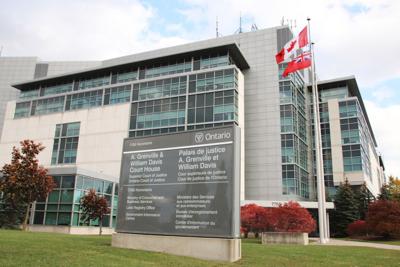A Brampton judge who handed out a conditional, non-jail sentence to a man convicted of his fifth impaired driving offence did not merely make a “clear error,” but committed “a wilful violation of her judicial obligation to apply the laws of this country to the best of her ability,” according to another judge overturning the lower court ruling.
“I view it as an affront to the administration of justice for a judge to choose to knowingly disregard and decline to follow the law that must be applied,” wrote Superior Court Justice Jennifer Woollcombe in her decision released last month.
Woollcombe was responding to an appeal by the Crown of a conditional sentence handed out by Ontario Court Justice Khatira Jalali after Joseph LeClaire pleaded guilty to driving while impaired on fentanyl — only 19 months after being convicted of impaired driving for the fourth time.
Woollcombe instead imposed a mandatory four-month jail sentence, which under the circumstances of this offender, is “an extremely lenient sentence,” she wrote, given that LeClaire was under a driving prohibition at the time of his arrest. The Criminal Code requires a minimum sentence of four months in jail for a third and successive impaired driving offence.Â
According to the facts supporting his guilty plea, LeClaire admitted that on Nov. 27, 2020, at around 8 p.m., he drove the wrong way on Winston Churchill Boulevard in Mississauga with only rims on the passenger side of a Toyota RAV4. Sparks flew from the damaged wheel rim, before the vehicle came to a halt and the driver fled. Police received multiple calls about his swerving vehicle.
“This extremely dangerous conduct put members of the community, both other drivers and pedestrians, at significant risk of death or injury,” Woollcombe wrote.
LeClaire fled the scene but was located and observed to be unsteady on his feet and slurring his words. He advised he was wearing a Fentanyl patch for back pain. Testing confirmed a small baggie found on the driver’s side of the vehicle contained fentanyl. His blood contained 38 nanograms of fentanyl and 131 nanograms of etizolam.
LeClaire was driving his wife’s vehicle that he had taken without her consent after she had hidden the key. He was under a two-year driving prohibition made after his most recent impaired driving conviction on April 26, 2019.
The appellate judge included an exchange between Jalali and the prosecutor during the sentencing hearing in March. The Crown’s position was that he should be jailed for four months, and that he could serve in time in an infirmary, as opposed to the jail’s general population.
“What would you do if I sentenced the gentleman to four months conditional anyways?” Jalali asked Crown attorney Brennan Jackson.
“That is not permitted by statute,” Jackson responded.
“I know, but what if I do?” the judge replied. The Crown told her he would have to seek advice from management.Â
At the appeal stage, LeClaire was represented by defence lawyer Ines Gavran. She told the Star on Thursday that it is rare for a sentencing judge to acknowledge the law and do something else.
“Judges are presumed to know the law. The are also creators of the law. It is the most important public duty owed to society and one that continuously must feed the public’s trust,” she wrote in an email.
“In my view, no one benefits from wilful disregard of the law. It sends the wrong message to the public, it negatively impacts those affected by the outcome and discredits the proper administration of justice.”
She added: “Criminal laws are complex, judges are human, and mistakes happen.”
While it may seem “counterintuitive,” Gavran agreed while the four-month sentence had to be imposed, she disagreed on whether he needed to be jailed. An appeal court can decide not to jail an offender in some circumstances even when the correct sentence is actual custody, she noted.
She asked the court to stay the remainder of the sentence and to dismiss the Crown’s request to jail LeClaire for four months, arguing he has demonstrated significant rehabilitation by overcoming addiction, the fact the offences were dated, he pleaded guilty, and locking him up in a jail would be onerous given his medical conditions and age.
Woollcombe wrote in her ruling that while she can understand why he doesn’t want to go to jail it “is necessary and appropriate in all circumstances.”
He was convicted of his third impaired driving offence in 2005 and avoided jail for that and received a fine. He was convicted of his fourth offence, 19 months before this one, when he was sentenced to 45 days intermittent, a type of jail sentence where offenders serve their time in chunks of time, such as weekends.Â
Nevertheless, “jail appears to have had little deterrent effect on him,” Woollcombe wrote.Â
On July 15, when the decision was released, she gave him 48 hours to step into custody.Â


























To join the conversation set a first and last name in your user profile.
Sign in or register for free to join the Conversation